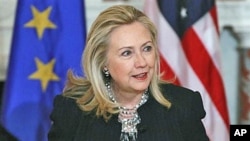U.S. Secretary of State Hillary Clinton visits Burma this week, the first trip there by a U.S. secretary of state in more than 50 years.
Clinton departs Monday for Asia, first stopping in South Korea before traveling on to Burma. Her visit to the isolated country begins Wednesday.
|
VOA’s Ira Mellman spoke with Priscilla Clapp, the former U.S. Charges d'Affaires to Burma from 1999 to 2002 about Secretary Clinton’s visit. She said she thinks the visit can be read as a reaction to what the State Department sees as a positive response with regard to reconciliation with the opposition and a desire to make peace with ethnic minorities.
|
U.S. President Barack Obama announced earlier this month he was sending Clinton, saying the U.S. is responding to what he called "flickers of progress" from the Burmese government, which ended decades of military rule in March when it brought in a civilian parliament.
Obama mentioned steps by Burma to open a dialogue with opposition leader Aung San Suu Kyi, the release of some political prisoners and the opening of the political environment. He said that if the country continues to travel down the road of democratic reform, it can forge a new relationship with the U.S.
Obama said he had spoken by phone with Suu Kyi for the first time earlier, and confirmed that she supports American engagement to move the process forward.
The president said that on her trip, Clinton will explore what the U.S. can do to support progress on political reform, human rights and national reconciliation.
Obama cautioned that despite the apparent progress, Burma will need to go further with reforms to have a new relationship with the U.S. He cited ongoing concerns about Burma's closed political system, its treatment of minorities, its holding of political prisoners and relationship with North Korea.
The president's recent announcement on Burma was the most significant U.S. policy move on the country in years. The U.S. and other western nations have imposed sanctions for decades on the country for its human rights abuses and failure to enact democratic reforms.
Some information for this report was provided by AP and AFP.




